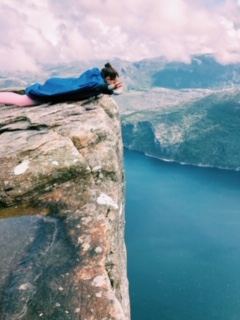At the beginning of my first-year fall at Princeton, I told myself I was going to study abroad in France. How? I had no idea. Shoot! I was just aiming for the moon and hoping to land among the stars. I knew that Princeton offered summer abroad programs. I did not know how I, a low-income, first generation college student, was actually going to finesse my way into France. I had never been to Europe, but my “Take Me to Paris” wall decal and Eiffel Tower throw blanket may have suggested otherwise. We know how this story ends, because, well, I am writing this blog post. This is not your average I-went-to-France-and-took-a-picture-with-the-Eiffel-Tower story. Let me tell you about how a low-income student made it to France. The experience was priceless, but let's be real, the ticket was not. Let’s talk about the money.
After taking my last intro-level French course, I was eligible to apply for a Princeton in France study abroad program in Aix-en-Provence. This program offered four weeks of language immersion. Around the same time, I also applied for an internship in Paris – shocker – through the International Internship Programs (IIPs). This is open to all students without a particular class prerequisite.
Now, the money. I applied for funding for my trip to Aix-en-Provence through the Student Activities Funding Engine (SAFE), the funding source used on campus for students to apply for grant aid for thesis research, independent research, summer opportunities or even those specific to different breaks. Built into the cost of the abroad program was housing, food and the class. The flight ticket was not included in that cost, but through SAFE, students can apply for grants that may cover some, most or all of these expenses, depending on the grant. (It doesn't hurt to apply to multiple and hope for the best.) Different grants have different post-trip requirements such as saving receipts, sending letters to donors or writing a reflection piece. For the internship, IIP offers its own financial aid for eligible students, so I didn’t need to apply through SAFE.
Applying for funding in Europe for IIP was challenging because of currency rates. Make sure to check out conversion charts if you're going abroad! I did not want to play myself by doing a one-to-one conversion. Applying was not a long process, but it did ask for a breakdown of all expenses. This includes how much you expect to pay for housing, travel and transportation. Although I was not accepted into the IIP, a few weeks later, I was accepted into the Aix-en-Provence program with immaculate funding for the trip. It covered the cost of the class and some of my transportation.
My trip to France helped me begin my journey towards managing my finances and being aware of my spending habits. I explored a new country while exploring myself, my beliefs, values and morals. I also learned so much about being financially conscience and taking chances. Applying for financial assistance for my trip to France gave me the perspective to understand the expenses needed for a trip abroad and how to best allocate my funds. If you have any questions about my experience, please feel free to reach out to me or check out the Aix-en-Provence program.









